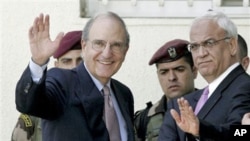A top Palestinian official says his government will give the U.S. the "two to three weeks" it requested to relaunch direct peace talks with Israel, but will not bend on its key demand for a halt to Israeli settlement activity in the West Bank.
Chief negotiator Saeb Erekat said Thursday that while the Palestinian Authority is prepared to wait for a U.S. offer, Israeli Prime Minister Benjamin Netanyahu must make the key choice between settlements and peace. He spoke after meeting U.S. Middle East envoy George Mitchell in Washington.
Erakat said that in the absence of peace talks, he expects the Obama administration to support a recognition of Palestinian statehood by the United Nations. That drew a rebuke from State Department Spokesman P.J. Crowley who reiterated the U.S. view that an independence move without Israeli concurrence will not advance the peace process.
U.S. Secretary of State Hillary Clinton, while traveling in New Zealand Thursday, confirmed plans to meet Mr. Netanyahu early next week either in Washington or New York as part of a stepped-up effort to break the stalemate in Israeli-Palestinian talks.
Meanwhile, the Reuters news agency quoted Egyptian Foreign Minister Ahmed Aboul Gheit as saying he will visit Washington Tuesday as part of the diplomatic push.
Earlier Thursday, Egypt's influential intelligence chief, Omar Suleiman, met with Mr. Netanyahu and Israeli President Shimon Peres on the Mideast peace process. There was no word of a breakthrough. Suleiman said his government was very concerned about moving the peace process forward.
The three leaders discussed efforts to revive direct talks, which stalled after an Israeli settlement moratorium expired in September. Palestinians have insisted they will not return to the talks while Israeli building continues on land they want as part of a future state. Last week, Palestinian President Mahmoud Abbas met with a high-level Egyptian delegation that included Suleiman and Gheit.
At an October meeting, Arab League leaders said they would give the United States until early November to resolve the impasse before reconvening to consider alternatives.
Some information for this report was provided by AP, Bloomberg and Reuters.




